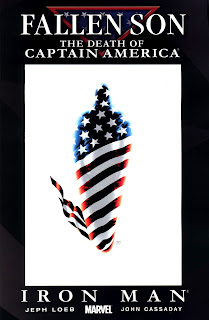Denial opens with Wolverine and Bucky meeting in an abandoned barber shop. "I don't buy it." Wolverine says. Even though Bucky was a first-hand source, a witness to the death of Cap', Wolverine is convinced that the kid only saw what the enemy wanted him to see. Even though all inquiries pointed to the fact that Steve Rogers died, Wolverine wouldn't accept it.
He ends up recruiting Dr. Strange and Daredevil. They help him break in to a SHIELD helicarrier. They leave when Wolverine discovers that Cap's dead body is there. He is dead. Iron Man and the Atom arrive to arrest Wolverine (due to the Civil War he is one of the hearoes wanted at large). They let him go. As Wolverine tells Tony himself, "You want me to go back and tell them. Anybody who had hope. Who are in denial... That I've got proof."
The meeting of Wolverine and Bucky echoes how the room must have been where the disciples were hiding (behind locked doors). They all knew what happened, but might not have wanted to admit it. Then, suddenly, Christ appeared. He shows them his hands and his side pretty much saying, "Yeah, I died." But, also proclaiming, "I came back, I won." Jesus didn't make it hard for us to remember that he actually did die, instead of making us search for proof he delivered it to us.
Later, Thomas denied that Christ would have come, saying that he would not believe it until he is able to see and touch the sacrificial wounds of Jesus. Instead of Thomas needing to later break into a helicarrier in order to see whether or not his leader was truly dead, Jesus came to the room a second time in order to prove that yes, he was dead, but also to prove that he now lives. (John 20:19-29)
Later, Thomas denied that Christ would have come, saying that he would not believe it until he is able to see and touch the sacrificial wounds of Jesus. Instead of Thomas needing to later break into a helicarrier in order to see whether or not his leader was truly dead, Jesus came to the room a second time in order to prove that yes, he was dead, but also to prove that he now lives. (John 20:19-29)
Even though the followers in the room might have lost their hope for Christ, it was renewed by his return. Lent is a time to remember the humility of God in his sacrifice. We may grieve in Christ's death, but we may also rejoice in it. Because, even after it had all been said and done; Christ showed to us that he was stronger than even death itself. Nothing could beat him.
John 19:30
I'm sorry if this devotion has been led astray from the common Lenten themes, dwelling in Christ's death. But, it's difficult to do so when Christ remains so alive. Perhaps, I should have had a **Spoiler Alert** for the season, but it is important to know both sides of Christ's life; the before and after crucifixion.
Arguably, the Five stages theory has been disproved. Even though it is natural to grieve over somethings, it is not always the case. According to George Bonanno, some people who have lost something are too resilient to grieve. If there is no grief then there aren't five stages to pass through. Isn't this where we are as Christians? Even though we may want to grieve or feel guilty for what we have done, Christ says "it is finished." It is not necessary to dwell on our sin and our trespasses once we are told that we should dwell on Christ instead. If we only remember that we are the one's who killed him, we may forget that he is the one who saved us. Focus needs to remain on God, not us, for he is the one who truly has the power to save or condemn (and he chooses to save).
Arguably, the Five stages theory has been disproved. Even though it is natural to grieve over somethings, it is not always the case. According to George Bonanno, some people who have lost something are too resilient to grieve. If there is no grief then there aren't five stages to pass through. Isn't this where we are as Christians? Even though we may want to grieve or feel guilty for what we have done, Christ says "it is finished." It is not necessary to dwell on our sin and our trespasses once we are told that we should dwell on Christ instead. If we only remember that we are the one's who killed him, we may forget that he is the one who saved us. Focus needs to remain on God, not us, for he is the one who truly has the power to save or condemn (and he chooses to save).
Still, even though it may be unnecessary, often times we do go through these stages of grief. The heroes did when America's son fell and Christians may because God's Son fell. They give us points to reflect on in our lives and in Christ's life. And, they will be a useful pattern to follow through the rest of Lent.
To be continued...
Make sure to check in next time
as we discuss the second stage of grief "Anger:"






















